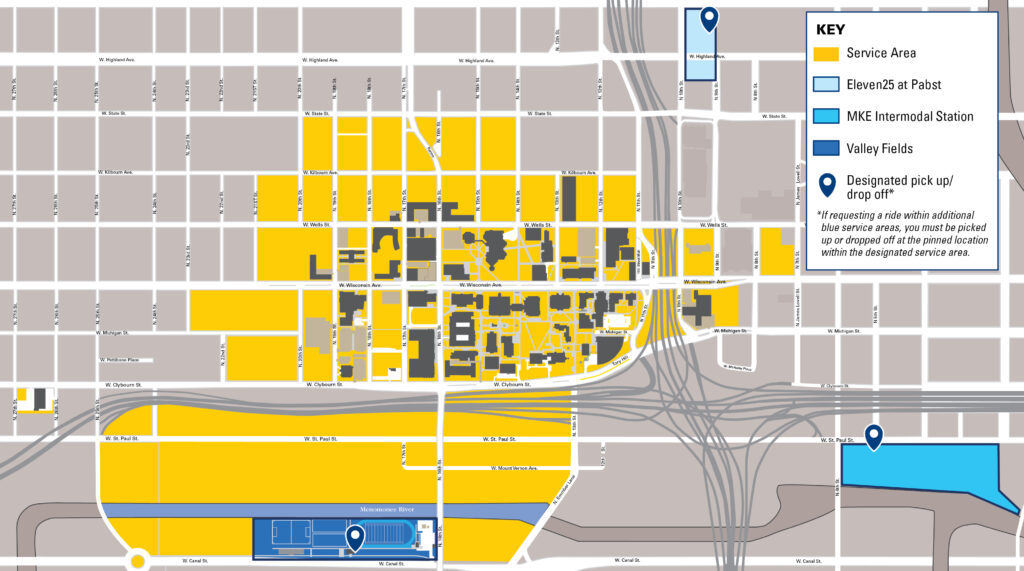Marquette University is modifying the Marquette University Police Department patrol zone on the east and west perimeters to better align with on- and off-campus student living trends and recent changes in university property ownership — specifically the sale of land south of Michigan Street. The Milwaukee Police Department will retain its existing jurisdiction within the current and new MUPD patrol zone.
The new MUPD patrol zone (pictured below) will take effect June 1, 2024. This change follows discussions with law enforcement and elected officials and addresses feedback shared with the President’s Task Force on Community Safety. The footprint of the free evening rideshare service will change next summer in tandem with the patrol zone adjustment.

“Fine-tuning the MUPD patrol zone will focus resources closer to our students, employees and campus activities; create more visible MUPD patrols; and enable even faster MUPD response times,” said Joel Pogodzinski, executive vice president and chief operating officer. “We are grateful to have a commissioned police department and take that responsibility seriously by ensuring the operation aligns with our footprint and mission to maintain a safe environment to learn, live and work at Marquette.”
Marquette University is the only private institution in Wisconsin with its own commissioned police department, and MUPD is fully funded by the university. Marquette was granted the authority to create MUPD under 2013 Wisconsin Act 265 as a result of a recommendation by the 2007 State of Wisconsin Governor’s Task Force on Campus Safety. When MUPD became a commissioned police force on May 1, 2015, the Milwaukee Police Department retained primary jurisdiction of the area with MUPD serving as an additional layer of law enforcement. Since that time, Marquette had expanded the MUPD patrol zone when the university purchased new property.
Implications when signing leases for 2024
Most residential students live within the MUPD patrol zone, and the university recommends students be mindful of the patrol zone change when signing leases for after June 1, 2024, understanding the value of living within the MUPD response area and EagleExpress service area.
“We’re aware that many students consider housing decisions for next year during the fall semester, so we wanted to share this information right away so they can make informed decisions,” said MUPD Chief Edith Hudson. “As always, we encourage students to live within the MUPD patrol zone so we can provide our proactive services, such as Vacant House Watch, in addition to responding to any safety concerns.”
For students using Rent College Pads to evaluate living options for the next academic year, the updated dotted line boundary on the listing map indicates the new zone. Additionally, the Office of Residence Life and Rent College Pads will co-host a student housing fair with area landlords on Sept. 28 at 11 a.m. until 2 p.m. on the 2nd floor of the AMU.
Continued commitment to community relationships
MUPD staff and community-focused faculty, staff and students remain directly involved in community initiatives that lead to a stronger shared neighborhood with initiatives focused on safety, community vitality, business development, resident well-being and public health. These ongoing university commitments include:
- Near West Side Partners, Inc. and its working groups — Marquette University is a founding anchor institution of the NWSP with university personnel, including MUPD officers, co-leading or serving its core working groups: Safety, Tenant Council, Homelessness Intervention Unit and Community Partnership Unit.
- Promoting Assets and Reducing Crime (PARC) — This cross-collaborative, private-public partnership works to address the needs of the community in four areas: safety, housing, commercial corridor development, and neighborhood identity and branding.
- Patient Centered Outcomes Research for Employees (PCORE) — Two Marquette faculty lead this proactive public health model for developing and promoting employee wellness using an employee-centered approach.
- Rev-Up MKE — The annual competition attracts new businesses and acts as a catalyst to spark interest and development in the commercial corridors of the Near West Side.
- CAMPus Impact — Offered through the Marquette University Center for Peacemaking, this immersive experience encourages student engagement in the nearby neighborhoods.
- Safe & Sound — Safe & Sound unites residents, youth, law enforcement and community resources to build safe and empowered neighborhoods.
- Anchor Institutions Task Force — The action-oriented learning community of nearly 1,000 individual members in the U.S. and abroad focuses on strategically leveraging anchor institutions, particularly higher education and medical institutions, to improve the economic, social and civic health needs of communities.
- Board leadership and participation on BIDs #10, #26 and #5.
“Community vitality is a shared responsibility, and complex safety issues in our city rely on partnership and follow-through,” Hudson said. “When the university convened the President’s Task Force on Community Safety in 2022, we invited community partners to co-lead committees and share their perspectives with us. Many of the resulting solutions benefit safety for the greater public.”
The President’s Task Force on Community Safety identified safety and security priorities and proposed recommendations to implement. Safety remains an ongoing priority at Marquette.
Working closely with Milwaukee Police Department
In operating and maintaining its own police department, Marquette provides a valuable safety and security asset to the city of Milwaukee, as 90% of the MUPD patrol zone is public right-of-way. The university shares its resources, such as security camera footage, with neighboring law enforcement entities. Most recently, establishing the MUPD Behavioral Health Unit provided an opportunity to pursue resources other than the criminal justice system when mental health concerns arise.
“We enjoy a collaborative relationship with the Milwaukee Police Department, and work with District 1 and District 3 on incidents that arise where we share boundaries,” Hudson said. “We’ll continue to be an active part of the robust system of law enforcement that supports residents and businesses in the Near West Side, Menomonee Valley and Westown.”
Learn more about university safety and the important role of MUPD.


